Exclusive
Power of the National Assembly to scrap a State
Published
10 years agoon
By
Olu Emmanuel
By CHRIS AKIRI
IN its Tuesday, May 3, 2016 edition, on pages 43 and 48, The Guardian carried the contents of an interview it granted to Mr. Kemi Balogun, a Senior Advocate of Nigeria (SAN), in which interview Mr. Balogun wrongly asseverated that the National Assembly could easily set at naught, to use his language, scrap, any of the federating units (States, like Ekiti, for instance) as currently constituted if it is able to mobilize two-thirds of its members to do so. According to him, “they (the States) have no option because they are the creation of the centre….” Continuing, he said, “The centre that created them can swallow up the states here. An Act of the national assembly can scrap them…If 2/3 of national assembly elects to scrap a state, it is scrapped.” Two-thirds of the National Assembly? That is, about 312 national parliamentarians can scrap a State, a federating unit? I beg to disagree, with respect.
Apparent in the foregoing statements of the learned Senior Advocate is a certain sad misconstruction of the constitutional provisions on the limits of the powers of the National Assembly. The Constitution of the Federal Republic of Nigeria 1999 (as amended), the fons et origo of the Nigerian legal system, provides in its section 2 subsection (1) that “Nigeria is one indivisible and indissoluble sovereign state to be known as the Federal Republic of Nigeria.”
Subsection (2) thereof forcefully reinforces that stipulation by announcing that “Nigeria shall be a Federation consisting of States and a Federal Capital Territory.” For good measure, section 3 (1) thereof bolsters up subsection (2) when it expressly delineates the number of States in the Federation. So, for the National Assembly to ever think of doing something about scrapping a State (a federating component), it has to amend section 3 (1) and the first column of Part 1 of the First Schedule to the 1999 Constitution (as amended) in line with the restrictive provisions of section 9 (1) (2) thereof.
Where that gamble ever succeeds, it must be noted that in a federation, each of the constituent units has homologous powers, never mind that the Nigerian federating units were the creation of Decrees. The learned Senior Advocate ought to know that if a military Decree decreed any matter into being, such a matter acquired the irrefrangible and inviolate sanctity of continuance until set aside by another Decree. Not so easy in a democratic dispensation! A federating unit created by a Decree immediately acquired a coordinate status with the central authority.
Political pundits, worldwide, agree that a federation is characterized by a union of partially self-governing states (as in Nigeria) or cantons (as in Switzerland) or regions (as in Australia) or Bundeslander (as in Germany and Austria) under a central government. In a federation, the self-governing status of the components, as well as the division of power between them and the central (federal) government, is typically constitutionally entrenched and may not be altered by a unilateral decision of either party, the states or the federal political body.
According Sir Kenneth C. Wheare, former Rector of Exeter College, Gladstone, and Professor of Government and Public Administration, University of Oxford, and author of “Federal Government”, “The federal principle requires that the general and regional governments of a country shall be independent each of the other within its sphere, (and) shall not be subordinate one to the another but co-ordinate with each other….” The Constitution of Nigeria says that Nigeria, by reason of its being a disparate congeries of ethnic nationalities, is a federation. So, whether the practice of federalism in Nigeria by over-ambitious Nigerian rulers dovetails into that entrenched constitutional provision or not is immaterial. The centre cannot legislatively wish away one of the component parts of the Federation. The National Assembly cannot even remove a State Governor or his Deputy let alone scrap the State over which they preside. The proviso to section 11 (4) of the Constitution warns the National Assembly:
ALSO SEE: National Assembly of fraudsters
“Provided that nothing in this section shall be construed as conferring on the National Assembly power to remove the Governor or the Deputy of the State from office.”
The powers of the National Assembly over the States are limited to those spelt out in section 11 (3) (4) of the Constitution and to those adumbrated on the Exclusive Legislative List, which are outside the jurisdiction of State Houses of Assembly. Even where the National Assembly, under section 11 (3) of the Constitution, can legislate on behalf of any State House of Assembly during a period of war involving Nigeria, the extension of such legislative powers terminates with the end of the war. Prof. K.C. Wheare, in his “Federal Government”, warns that “this extension of authority cannot be justified in time of peace, of course, and it is natural that after a war the limits of the general government’s authority will recede.”
Section 9 of the 1999 Constitution provides that, “The National Assembly may, SUBJECT to the provisions of this section (i.e. subsections (3) and (4) thereof), alter ANY OF THE PROVISIONS OF THIS CONSTITUTION” (emphasis added). The scrapping of a State (a federating unit) is NOT one of the provisions of the 1999 Constitution, which the National Assembly has powers to alter, neither is such a power located in either the 68-item Exclusive Legislative List nor in the 30-item Concurrent Legislative List.
I dare say, with the profoundest respect, that it becomes clear that the Senior Advocate of Nigeria laboured under some insuperable confusion and a penumbra of irrationality when he blurted out that: “Majority of them (i.e. of the States) were created by decrees. We do not have decrees again. What we have now is the national assembly,” suggesting that the National Assembly has more powers than the military authorities ever paraded! He knows or should know that the military and its Decrees, unrestricted by any rule, written or otherwise, could and did promulgate, by military fiats, laws which the National Assembly, hedged about by restrictive constitutional provisions, cannot venture to enact?
Today, the powers given to the National Assembly by the Exclusive and even Concurrent Legislative Lists of the 1999 Constitution are so unwieldy, so enormous, they make the national legislature hard put to it to find its way in the labyrinth of law making. Mr. Kemi Balogun, SAN, should not add more to the functions of the National Assembly. Instead, he should add his influential voice, as a Senior Advocate of Nigeria, to the strident calls for devolution of powers from the centre to the federating units, and for fiscal federalism.
You may like
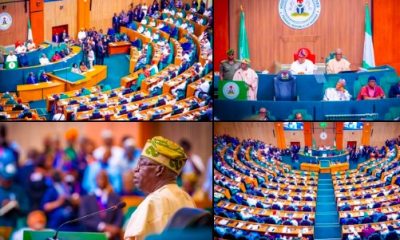

President Tinubu covers up Gaffe’ during 2025 budget presentation
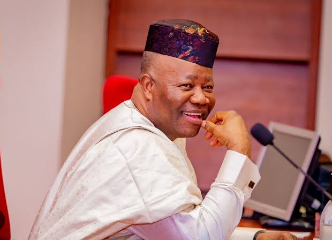

No impeachment threat against Akpabio
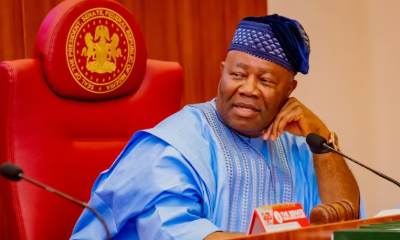

Akpabio dismisses impeachment rumors, labels them ‘Fake News
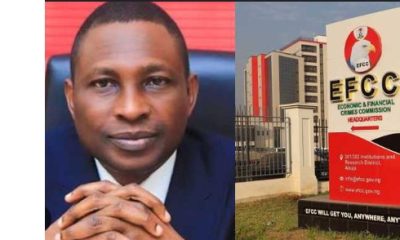

EFCC Chairman urges lawyers to stop shielding financial crime suspects
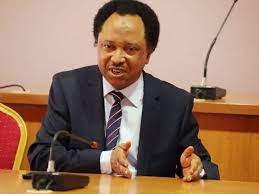

Shehu Sani reaffirms Senators receive N13.5m monthly allowance


JUST IN : ADC Rep defects to APC
Trending

 Business1 week ago
Business1 week agoNaira mixed across markets as official window dips, parallel market strengthens

 Football1 week ago
Football1 week agoUCL Playoff: Gordon scores four as Newcastle thrash Qarabağ 6-1

 Entertainment6 days ago
Entertainment6 days agoSinger Simi faces backlash after TikToker admits to false rape allegation

 Latest1 week ago
Latest1 week agoLegal constraints, not connectivity, delay electronic results — Igini

 Entertainment3 days ago
Entertainment3 days agoSimi addresses resurfaced 2012 tweets amid online backlash

 Business1 week ago
Business1 week agoThree Crowns Milk launches nationwide Ramadan campaign to promote heart-healthy nourishment

 Latest1 week ago
Latest1 week agoTinubu defends electoral reform, downplays mandatory real-time upload

 Comments and Issues6 days ago
Comments and Issues6 days agoNigeria’s Declining Oil Output and Soaring Foreign Portfolio Investment Inflow

